16 Delightful Sayings We Need to Bring Back
These expressions let you do everything from give advice to describe your feelings, with charm and originality. So, the next time you get "folded into fours," (slide 7) you'll know how to explain it.
By Liesl Schillinger

Designer: Jen Troyer
Have you ever gotten angry at somebody preemptively, because you thought they might get angry at you? This perverse but all-too-human predicament is called "borrowing a jack." The phrase comes from a shaggy-dog story the comic-actor Danny Thomas told on his TV show in the 1950s. A traveler had a flat tire while driving in the country, and discovered he didn't have a jack. Spotting a farmhouse a mile off, he started walking toward it, so he could borrow a jack and change his tire. But as he walked, he convinced himself that the farmer wouldn't trust him, would think he was a con man and would refuse his request. By the time the traveler got to the house, he was so offended that when the farmer came to the door, he shouted at him, "You can keep your dang jack!" and stomped off. The moral of this one is, have a little faith.
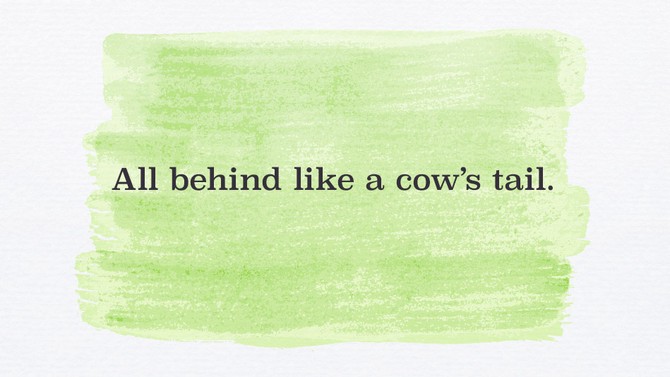
Designer: Jen Troyer
If you ever feel overwhelmed because you can't possibly get all the things done that you have to, then you're a lot like Mrs. Bridges, the cook in Upstairs Downstairs, who wailed that she was "all behind like a cow's tail" when she was running late in her dinner preparations. The phrase was common at the turn of the last century, but the Roman writer Petronius actually minted the expression 2,000 years ago: "Tanquam coda vituli." It sounds better in English; and, for the record, Mrs. Bridges did catch up in time.

Designer: Jen Troyer
Cats have no trouble making humans laugh—by now, Tom and Jerry, Lolcats.com and the most extreme sourpuss of them all, Grumpy Cat, have made that abundantly clear. But how often do humans return the favor? Rarely, judging from an expression from the American South, "Enough to make a cat laugh." It's not known what it was that provoked such whiskered mirth, but it must have been hilarious indeed.

Designer: Jen Troyer
Holly Golightly called it having the "mean reds," but when you're furious, sulking or bad-tempered—for a good reason or not—your ancient Midwestern relations are likely to observe that you are "in a faunch." The expression is said teasingly and indulgently—and it's worth reviving, because it recognizes that dark moods come to us all, and often shouldn't be taken too seriously. If you have a best friend who occasionally blows up at you over small things, take it in stride and tell yourself, "she's in a faunch" and know that it will pass.

Designer: Jen Troyer
Military pilots must be sharp-eyed, scouting out dangers ahead of them and on all sides. They use the hands of a clock to indicate from which direction trouble is coming. But there remains one spot that is the most vulnerable of all: six o' clock, the position directly behind them. So whether in the air, on the sea or on the ground, when one soldier tells another, "I've got your six," it means, "I'm looking out for you." When you're feeling vulnerable, remember that problems often come from where you least expect them; and, a friend may be your best defense.

Designer: Jen Troyer
Sometimes, children say or do things that show them to be wiser than their elders. Russian parents have a grudging way of describing this phenomenon: "The eggs shouldn't teach the hen!" (Яйца курицу не учат!) But Tolstoy, more generous-mindedly, flipped the phrase in War and Peace. When young Natasha Rostov told her flurried parents they ought to make room in their wagons for wounded soldiers as the family fled Moscow, her father was moved by her noble impulse, and said humbly, "The eggs are teaching the hen." ( Яйца курицу учат.) Tolstoy knew that insight is not necessarily tied to age.

Designer: Jen Troyer
Do you knock yourself out for people, take pains, go the extra mile? Dutiful French people do, too—but when they go to contortions to please others, they call it "folding yourself in four"—se plier en quatre. This is a picturesque way to capture the effort of benevolent exertion, and also suggests a touch of remarkable perfectionism—not just bending over backwards, but bending four times, sacrebleu!

Designer: Jen Troyer
If you're feeling poorly, borrow a page from the avian kingdom and say you're "sick as a parrot." Why a parrot? Remarkably, this curious comparison predates the Monty Python "dead parrot" sketch. Several lively theories, none of them provable, explain its origin: One is that parrot smugglers from South America used to sedate birds to sneak them quietly across the border to U.S. buyers. When the birds awoke from their drugged sleep, groggy and stumbling, their new owners thought they looked hungover and coined the whimsical comparison. Another theory suggests that "parrot" is a corruption of the French word "Pierrot" (i.e., a pasty-faced clown). Still others point to psittacosis (a contagious bird flu), or credit a mention in a 17th-century play by Aphra Behn. In any case, if you are unsteady on your pins, have a flutter with this metaphor—and take two aspirin.
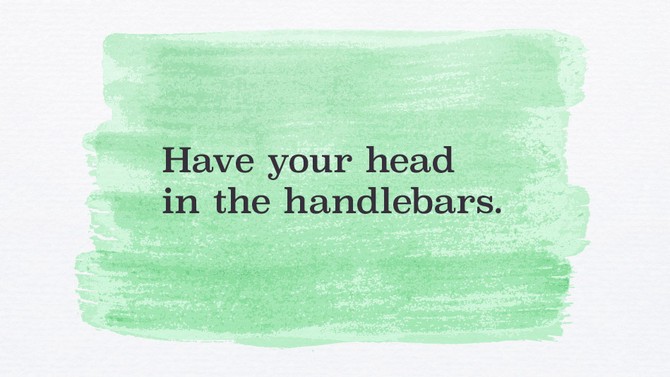
Designer: Jen Troyer
If you've ever watched the Tour de France, you've seen cyclists speeding along the route, pedaling like mad, hunched over their handlebars. They certainly are not taking time to appreciate the scenery; all they're thinking of is the finish line. A person who is so focused on her work and her end goals that she pays too little attention to every other aspect of her life is said by the French to have her "head in the handlebars"—avoir la tête dans le guidon.
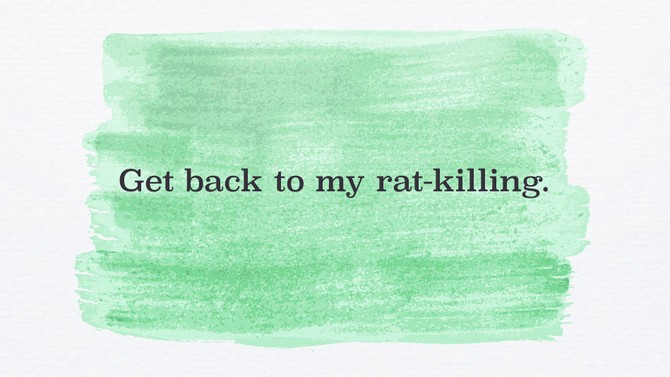
Designer: Jen Troyer
An easygoing yet effective way to end a rambling phone conversation comes from a humorous phrase used in the last century by people who were not far removed from rural life and remembered the need to defend barns and silos from hungry four-footed invaders. This is how my mild, blue-eyed Illinois grandmother (who grew up on a corn and soybean farm) signed off on phone calls. It just means "I've got to get back to work." So, the next time a friend IMs you when you're in the middle of a project, you can reply once or twice, then text that you've got to get back to your rat-killing.

Designer: Jen Troyer
Men and women tiptoe around this four-letter word, fearing to be the first to say it; fearing it will not be reciprocated if declared; fearing the word's weight might sink their relationship; and, acting as if heartbreak could be avoided by keeping it out of the conversation. The playwright Tristan Bernard denounced this semantic caution. "Ce qui ressemble à l'amour est toujours de l'amour," he wrote. "What looks like love is always love." Your heart knows what your lips don't say, he implied. In other words, love will make itself felt, no matter what you call it.

Designer: Jen Troyer
Not everyone who has advice to give means well by it; sometimes speakers' words serve themselves, not their audience. A cautionary German expression shows the risk of self-interested counsel: "When the fox preaches, look to your geese." (Wenn der fuchs predigt, so nehmt die gänse in acht) If you've ever worked in an office where the management talked about cost-cutting measures, you understand the implications. It's also a useful thought to hold in any election season.
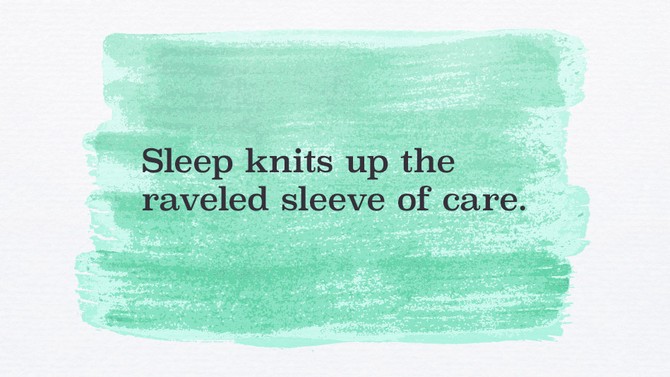
Designer: Jen Troyer
Lady Macbeth praised the healing properties of "sleep that knits up the raveled sleeve of care." Picture a sweater whose cuff has frayed, and imagine that cuff re-knitting itself and becoming whole again. That's what happens to your psyche when you sleep; it restores itself. This bit of wisdom got a friendlier exponent in the form of Jeeves, P.G. Wodehouse's valet hero, who liked to quote it to his feckless young employer, Bertie Wooster, when he came home tired and fuddled from too much reveling at The Ritz. But even if your cares are heavier than Bertie's, rest will lighten them.
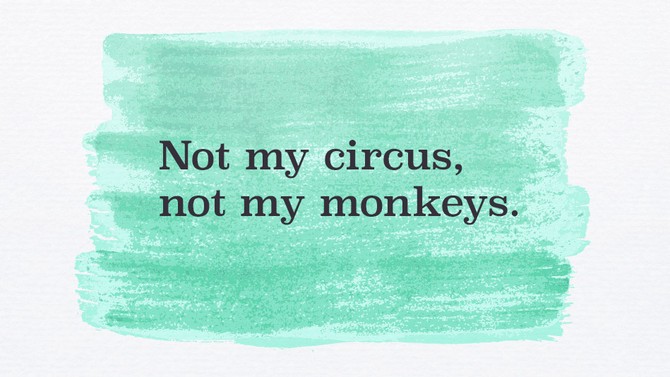
Designer: Jen Troyer
It's flattering to be valued and to have your input sought; but when your friends and colleagues try to rope you into projects that will overload your crazy schedule, try to resist the temptation to be indispensable. Tell yourself with relief, as they do in Warsaw, that it's their problem, not yours; and they could easily ask someone else (or rely on themselves). Repeat after us, "Not my circus, not my monkeys." (The original phrase is Nie mój cyrk, nie moje małpy, but don't bother trying to say it in Polish, that's not your circus...)

Designer: Jen Troyer
These fierce words of encouragement acknowledge that it's tough to achieve your ambitions. Not everyone can take the heat, and doing so requires fortitude and resolve. To say that "the same fire that melts butter forges steel" is to exhort someone to take pride in the difficulty of overcoming obstacles. Taking on challenges is daunting, but the prospect of overcoming them can strengthen and inspire.

Designer: Jen Troyer
Picasso believed that truly original expression comes from seeing the world as a child does—with fresh eyes and without preconception. To achieve that level of creative freedom in his art work took him decades; he had to let go of the formal rules of technique he had learned as he matured. When someone asked him why his paintings looked childlike, he took it as a compliment: "It takes a very long time to become young," he responded. His comment serves as a reminder that it takes conscious effort to hold onto the conviction and vision of your young, idealistic self.
Published 03/05/2015

